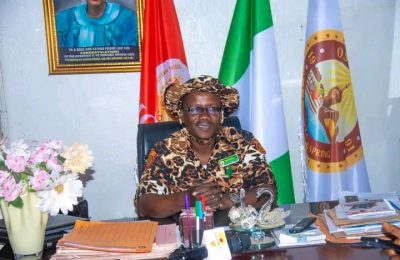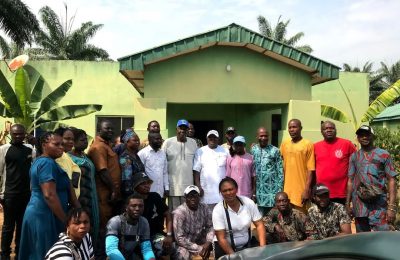

Leslie Okoye is a Skincare Expert and Educator. The founder of CookieSkin in Lagos, who has over fifteen years of hands-on experience with melanin skin issues, discusses with BIOLUWATIFE AKINYEMI the skincare industry in Nigeria among other related issues.

What made you venture into skincare business and education?
I entered the skincare industry because I realised that I knew it like the back of my hand. To put it another way, I have been playing with and observing my skin since I was 12 years old. I was shocked to see how much filth was on the white washcloth I used while my mother was showing me how to properly wash my face. She taught me how to take care of my skin.
From there, my interest in skincare expanded, leading me to research and explore anything and everything skin. However, my biggest shift came when as a teenager, I interned as a Customer Care Rep. in the United States for a skincare company. Working there, I felt the dismay and depression of women that came feeling helpless about their skin. It was that feeling of depression that I sensed each time from women confused about their skin that lead me to create a brand for them.
The disregard for education on melanin skin on an international level and the lack of understanding, is why I began an academy and decided to teach. In the same way that Africans and African Americans are better at understanding how to take care of black hair, I want to ensure that Nigerians, Africans, and African Americans with melanin skin are aware of how to take care of their skin and achieve the desired results.
How did you come about the name Cookieskin and what are the services it renders?
My husband came up with the term CookieSkin. When I asked him to help me brainstorm on a name for my company, he became distracted by my skin. I got upset and asked him why he wasn’t helping or taking me seriously and he said, “how could he focus when my skin is so fresh that it is distracting him?” He then suggested that I name it “COOKIESKIN” and added that everyone should strive to have skin that is so fresh that it’s edible and makes their husbands want to nibble on it.
As an entrepreneur in this present economy, how have you been able to sustain your brand over the years?
I feel like I’m lucky. I thank God for keeping the business especially living in a country like Nigeria. It’s tough, but I remind myself that I haven’t even captured 3% of the market, so there must be hope. Plus, great brands don’t happen overnight, so I keep on.
Entrepreneurs must first prepare for inflation. Beyond pricing, I try to give my consumers services and products that are unique in comparison to what is currently on the market. For instance, when a customer comes to us unsatisfied after trying everything, we create a custom formula after a free consultation. Due to this, we have been able to remain competitive and meet the needs of all of our clients.
How lucrative will you describe the skincare production, looking at the influx of people who venture into the business in recent years?
The production of skincare is a respectable industry. Note that there is no real money in it if you are doing it on a small scale. It will only make business sense if you have finance, such as a bank loan or venture capital, and you can construct a factory and engage in large-scale production of your products. Other than that, I wouldn’t say that skincare production is a lucrative business.
Who are your target audience?
My target audience includes all people of colour with skin that is light, brown, caramel, or black in hue. My audience can come from anywhere—Africa, America, India, etc.—as long as they have dark skin or skin of colour and skin that can tan.
What are the challenges surrounding this line of business and your brand?
There are practically no impediments to doing business, thus the biggest difficulty is the noise. Social media creates an excessive amount of noise and distraction, especially for people with darker skin.
Our skin is different, and we are told that the wrong things should be done by following the crowd. The beauty care regimens we see on social media, such as exfoliation, scrubs, and chemical peels, don’t work as well on skin of color as they do on white people.
What is CookieSkin offering in 2023?
In 2023, CookieSkin is providing more information on melanin skin, encouraging people to take care of themselves, and aiming to see less damaged skin when people visit our office.
To prevent them from spending additional money on skincare products that will harm them, we want to provide them with the correct information so they can do it themselves.
What other things do you do as an individual?
In addition to consulting and specialising in skincare, I also manage a private weight-loss programme for individuals who choose to do so. It is a monthly programmes that is tailored to meet each person’s demands.
What advice will you give young entrepreneurs and people who intend to go into skincare business?
Young business people should continue learning about skin, not just through personal experience but also by taking a skincare course. Making sure your intelligence corresponds with global-level body intelligence, systems, and solutions—not just for one skin type but for all skin types and all skin colors, rather than organic skincare formulation.
Tell me briefly about Leslie Okoye
I studied Broadcast Journalism and have a Master’s in Management. I am a wife and the mother of two, originally from Abia State. Just know that I’m smiling on the inside despite my serious face.
Before I started CookieSkin, I worked for the African Development Bank in Tunisia, a federal contracting firm in Washington D.C and also conducted strategy brand marketing in Nigeria.








